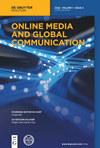Topic and sentiment analysis of responses to Muslim clerics’ misinformation correction about COVID-19 vaccine: Comparison of three machine learning models
引用次数: 1
Abstract
Abstract Purpose The purpose of this research was to use develop a sentiment model using machine learning algorithms for discerning public response about the misinformation correction practices of Muslim clerics on YouTube. Method This study employed three machine learning algorithms, Naïve Bayes, SVM, and a Balanced Random Forest to build a sentiment model that can detect Muslim sentiment about Muslim clerics’ anti-misinformation campaign on YouTube. Overall, 9701 comments were collected. An LDA-based topic model was also employed to understand the most expressed topics in the YouTube comments. Results The confusion matrix and accuracy score assessment revealed that the balanced random forest-based model demonstrated the best performance. Overall, the sentiment analysis discovered that 74 percent of the comments were negative, and 26 percent were positive. An LDA-based topic model also revealed the eight most discussed topics associated with ten keywords in those YouTube comments. Practical implications The sentiment and topic model from this study will particularly help public health professionals and researchers to better understand the nature of vaccine misinformation and hesitancy in the Muslim communities. Social implications This study offers the joint task force of Muslim clerics and medical professionals, and the future misinformation campaigns a sentiment detection model to understand public attitude to such practices on social media. Originality While the impact of misinformation on public sentiment and opinion on social media has been researched extensively, Muslim perspectives on combating misinformation have received less attention. This research is the first to evaluate responses towards Muslim clerics correcting religious vaccine misinformation using machine learning models.穆斯林神职人员对新冠肺炎疫苗错误信息更正反应的主题和情绪分析:三种机器学习模型的比较
摘要目的本研究的目的是使用机器学习算法开发一个情绪模型,以识别公众对穆斯林神职人员在YouTube上纠正错误信息做法的反应。方法本研究采用了Naive Bayes、SVM和Balanced Random Forest三种机器学习算法,建立了一个情绪模型,可以检测穆斯林对穆斯林神职人员在YouTube上反虚假信息运动的情绪。总共收集了9701条评论。基于LDA的主题模型也被用来理解YouTube评论中表达最多的主题。结果混淆矩阵和准确度得分评估表明,基于平衡随机森林的模型表现出最佳的性能。总体而言,情绪分析发现,74%的评论是负面的,26%的评论是正面的。基于LDA的主题模型还揭示了与YouTube评论中的十个关键词相关的八个最受讨论的主题。实际意义这项研究的情感和主题模型将特别有助于公共卫生专业人员和研究人员更好地了解穆斯林社区疫苗错误信息和犹豫的性质。社会影响这项研究为穆斯林神职人员和医疗专业人员的联合工作组以及未来的错误信息运动提供了一个情绪检测模型,以了解公众对社交媒体上此类行为的态度。独创性虽然错误信息对社交媒体上公众情绪和意见的影响已经得到了广泛研究,但穆斯林对打击错误信息的看法却没有得到太多关注。这项研究首次评估了穆斯林神职人员使用机器学习模型纠正宗教疫苗错误信息的反应。
本文章由计算机程序翻译,如有差异,请以英文原文为准。
求助全文
约1分钟内获得全文
求助全文
来源期刊

Online Media and Global Communication
Communication, Media Studies, Internet Studies, International Studies, International Relations-
自引率
0.00%
发文量
0
期刊介绍:
Online Media and Global Communication (OMGC) is a new venue for high quality articles on theories and methods about the role of online media in global communication. This journal is sponsored by the Center for Global Public Opinion Research of China and School of Journalism and Communication, Shanghai International Studies University, China. It is published solely online in English. The journal aims to serve as an academic bridge in the research of online media and global communication between the dominating English-speaking world and the non-English speaking world that has remained mostly invisible due to language barriers. Through its structured abstracts for all research articles and uniform keyword system in the United Nations’ official six languages plus Japanese and German (Arabic, Chinese, English, French, Russian, Spanish, Japanese, and German), the journal provides a highly accessible platform to users worldwide. Its unique dual track single-blind and double-blind review system facilitates manuscript reviews with different levels of author identities. OMGC publishes review essays on the state-of-the-art in online media and global communication research in different countries and regions, original research papers on topics related online media and global communication and translated articles from non-English speaking Global South. It strives to be a leading platform for scientific exchange in online media and global communication.
For events and more, consider following us on Twitter at https://twitter.com/OMGCJOURNAL.
Topics
OMGC publishes high quality, innovative and original research on global communication especially in the use of global online media platforms such as Facebook, TikTok, YouTube, Twitter, Instagram, WhatsApp, Weibo, WeChat, Wikipedia, web sites, blogs, etc. This journal will address the contemporary concerns about the effects and operations of global digital media platforms on international relations, international public opinion, fake news and propaganda dissemination, diaspora communication, consumer behavior as well as the balance of voices in the world. Comparative research across countries are particularly welcome. Empirical research is preferred over conceptual papers.
Article Formats
In addition to the standard research article format, the Journal includes the following formats:
● One translation paper selected from Non-English Journals that with high quality as “Gems from the Global South” per issue
● One review essay on current state of research in online media and global communication in a country or region
 求助内容:
求助内容: 应助结果提醒方式:
应助结果提醒方式:


